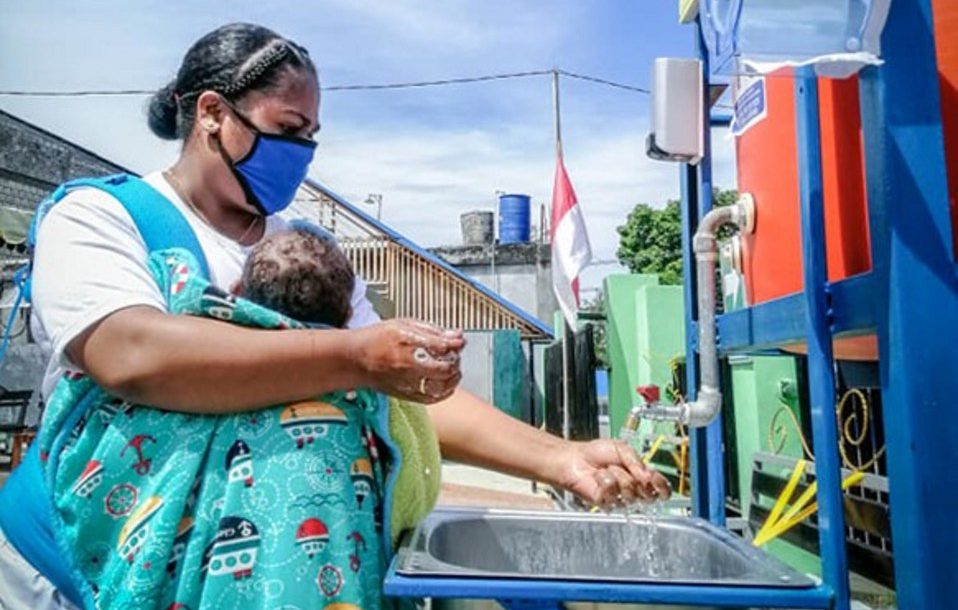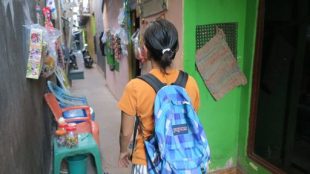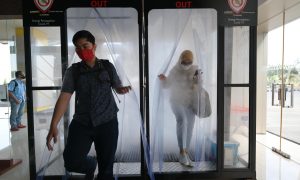While the Indonesian government is struggling to mitigate the health and economic impacts of COVID-19, less attention has been given to gender and how it matters in the handling of the pandemic. Women make up the majority of Indonesia’s healthcare workers and those who are working jobs in the heavily impacted informal sector. At least 30% of workers who have lost their jobs due to the pandemic as of June this year were women. Last month, the Ministry of Women Empowerment and Child Protection reported that there have been at least 3,605 cases of violence against women between early January and 21st August, with concerns of underreporting. These findings further the growing recognition that homes may not provide ‘safety’ as stay-at-home orders seem to suggest. These pressing conditions beg the question of how well the Indonesian government is doing in addressing the gendered impacts of COVID-19.
The Struggle with Data: What We Know
Data on localised gendered impacts and policies made in response to COVID-19 in Indonesia is scant. This issue, however, is not exclusive to Indonesia; many countries and even international bodies are struggling to track gender-sensitive policies. Several factors contribute to this problem, including a lack of resources to conduct wide-scope research on women generally, a lack of sense of urgency and a lack of access to continuously updated and complete data. Therefore, it is too early to claim a complete portrayal of the gendered aspects of COVID-19 in Indonesia. What is currently possible is to outline what is known and what is not.
As gendered impacts of COVID-19 are largely induced by the policies created to respond to it—such as lockdowns—it is useful to identify these policies and their possible gendered effects, and examine whether there have been further policies created to mitigate these impacts. CoronaNet’s coding system acts as a useful framework for this task, as the system captures a wide range of policy categories, from anti-disinformation and public awareness measures, to different health and hygiene procedures, to the intricacies of movement restrictions, with higher levels of granularity compared to most available datasets that collect information on COVID-19 policies to date. My examination of Indonesia’s policy responses to COVID-19 found that all of the CoronaNet’s policy categories were met by the Indonesian government.
Next is to recognise the possible negative gendered impacts of each of these policies. This was done by looking at known information related to COVID-19 in Indonesia and in reference to that of other countries, with the underlying premise that certain impacts in other countries may also occur in Indonesia but have yet to be documented. Thus, the impacts outlined here are not exhaustive. The identification of these impacts were followed by inquiries into whether gender-sensitive measures (defined as policies that are aimed specifically at gendered impacts or risks) were taken.
Since realising the dangers of COVID-19—after previously denying that the virus has entered the country—the government made efforts to communicate health protocols through television broadcasting and online media. Studies have found that women are more likely to be deprived of accurate information, and this is exacerbated by reliance on online sources during lockdowns. The Indonesian government has acknowledged the importance of ensuring that women have access to information and enacted targeted socialisation of health protocols, such as disseminating information through units of Pemberdayaan Kesejahteraan Keluarga (PKK), with the hopes that women would pass on the information to their families and children. The Ministry of Women’s Empowerment and Child Protection has also made efforts to collect gender-disaggregated data, although limited to mainly information regarding patients, suspected cases, and impacted economic sectors.
Several immediate impacts and risks of policies made to limit physical contact based on CoronaNet’s coding system include halts on worker migration and strains on businesses (including supply chains), which may lead to job loss and increasing rates of women in poverty. Effects that are not immediately visible include the increase of violence against women—as earlier mentioned—and the increased burden of housework and caregiving, as families spend more time at home.
Specific policies to address the economic impacts of COVID-19 mainly applied blanket standards. For example, the first rounds of aid packages (known as bantuan sosial) and the new Kartu Prakerja programme—a scheme designed to increase productivity skills with financial incentives—did not take gender into account in screening of applicants. Policies that did were those issued prior to the outbreak, such as Program Keluarga Harapan (PKH) and Mekaar, which were given increased budget. It was only in August, six months after the virus was discovered in the country, that the government announced that there would be a new round of social assistance prioritised for women, such as stimulus packages for SMEs run by women and aid for female breadwinners.
This is not to say that women could not receive benefits of the previously issued policies at all, as they do not necessarily discriminate against women. However, the approach used in the creation of these policies ignores that women may face more difficulty in accessing the promised benefits. For example, the Kartu Prakerja scheme requires applicants to complete online training before they can receive money. Women running small businesses, who are among the most vulnerable, may not have sufficient access to the internet and/or the digital literacy needed to complete the training and tests. This is very likely if we consider that in 2018, it was reported that only 37.49% of Indonesian women have access to the internet
There has been little mitigation on gendered risks for women inside the home. The operation of government-run help centres for victims of domestic and/or sexual violence, for example, have not been modified to fully adapt to the pandemic. While the launch of Sejiwa, an online psychological counselling service in late April was seen as a progress and recognition of mental health as an important issue, especially among women and children, there have also been reports that the hotline is understaffed. Further, nothing has been done to specifically address women’s additional burdens of time, energy, and emotion for housework, caregiving, and taking the main role of helping children with long-distance learning. Women remain uncompensated for their contributions in keeping their families safe at home.
Gradual Measures and Unclear Gendered Outreach
There are three main points to note from the available data.
First, the Indonesian government entered the battle against COVID-19 with a gender-blind lens. This could be seen from the initial responses to the pandemic, that did not take gender into serious consideration despite women making up slightly less than 50% of the Indonesian population. The belated announcement of stimulus and aid packages prioritised for women is further evidence. Additionally, as the implementation of previous social protection programmes has shown that not everybody who qualified as recipients has received the promised benefits, it is likely that the new aid packages would also stumble across a similar problem.
Second, while later efforts have been announced to address gendered impacts and risks of the pandemic, these efforts were mainly oriented towards problems deemed economic or related to conventional notions of productivity. Comments made by government officials regarding women’s vulnerability during the pandemic further reflected this, focusing on women’s contribution towards the national economy. Specific issues that are related to socially constructed gender roles, such as unpaid caregiving and household labour, were not seen as worthy of specific responses. Consequently, the additional physical and emotional burdens for women, are not sufficiently addressed by the government.
Legislating self-reliance and family values in the time of coronavirus?
At the heart of the Family Resilience Bill is the message that the family unit is responsible for its its own poverty and challenges.
Third, the lack of a gendered approach to the pandemic has hindered the collection of gender-disaggregated data. As gender was not deemed an important aspect, it was not incorporated into systematic research related to the pandemic in the country. This is also linked to the lack of gender-sensitivity in Indonesia’s policymaking in general prior to the pandemic, reflected in the still relatively low percentage of women in the Indonesian legislature and difficulties in pushing for women-empowering policies, such as the anti-sexual violence bill.
Thus, while the policy to test pregnant women for COVID-19 is an acknowledgement of women’s rights to healthcare during these times, it is still unclear whether there are systematic efforts to ensure that the tests are accessible for all pregnant women. Systematic measures are likely in bigger regions or cities like Jakarta and Surabaya, but less is known about the mainstreaming of this policy and data collection on its outreach in smaller and more remote areas. It would not be surprising if we later find similar problems arise in the implementation of the recently announced policies for women. Indonesia not only enacts poor measures in tracking mobility between regions, but it also lacks detailed gender-disaggregated data. Thus, while discrepancy between official data and de facto residency status of eligible applicants is an acknowledged problem, the problem is exacerbated for the women who are most vulnerable. The government even acknowledged that as of August, the exact number of female breadwinners who have received social assistance through the ongoing PKH was still unknown.
If Indonesia wishes to address the COVID-19 comprehensively, gender must be taken into account seriously. Indonesia’s ‘gender-sensitive’ policies, however, should not only focus on issues deemed conventionally productive and lucrative, as these only partially address the problems that women are facing. As current knowledge on gendered impacts of COVID-19 is limited due to minimum systematic data, we should begin this task by gendering the ways we construct our research of the pandemic going forward.
 Facebook
Facebook  Twitter
Twitter  Soundcloud
Soundcloud  Youtube
Youtube  Rss
Rss 



